|
Review Pages
Nintendo Channels
GameCube
Game Boy Advance
Nintendo 64
Classic Nintendo
Microsoft Channels
Xbox
Sony Channels
PlayStation 2
PlayStation
Sega Channels
Dreamcast
Other Channels
More Classics
Site Features
92530i Features
Specials
Top 11
Editorial
Downloads
Links
Contact Info

View My Guestbook
Sign My Guestbook

|

Chapter 8: 22-12
|
  |
Crazy Taxi
[Sega - Arcade/Dreamcast - 1999/2000]
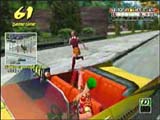 Crazy Taxi is one of those games that took me by suprise. When I had finally
bought a Dreamcast for myself, there was really only one game I knew I wanted at
the time, which was San Francisco Rush 2049. I bought that, and I also picked
up Crazy Taxi, since it was pretty cheap and I had heard pretty good things about it.
It's too bad I hadn't heard of the game sooner, because Crazy Taxi is a really
fun and really addictive game. It combines the crazy, stunt-like driving of
the San Francisco Rush series with the blazing speed of the Daytona arcade games
and yet it's not really about racing. The goal is to get as many people to their
destinations as possible within the time limit, and make as much cash off of them
as possible. It's also a very intuitve game to play, and you can pretty much get
a feel for the game after the first play. Although I wish the console version
had more places to drive around, it was still a very addictive and fun experience.
Crazy Taxi is one of those games that took me by suprise. When I had finally
bought a Dreamcast for myself, there was really only one game I knew I wanted at
the time, which was San Francisco Rush 2049. I bought that, and I also picked
up Crazy Taxi, since it was pretty cheap and I had heard pretty good things about it.
It's too bad I hadn't heard of the game sooner, because Crazy Taxi is a really
fun and really addictive game. It combines the crazy, stunt-like driving of
the San Francisco Rush series with the blazing speed of the Daytona arcade games
and yet it's not really about racing. The goal is to get as many people to their
destinations as possible within the time limit, and make as much cash off of them
as possible. It's also a very intuitve game to play, and you can pretty much get
a feel for the game after the first play. Although I wish the console version
had more places to drive around, it was still a very addictive and fun experience. |
  |
Silent Hill
[Konami - PlayStation - 1999]
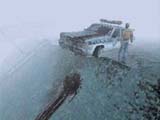 Silent Hill was another one of those games that I bought on a whim. I wasn't
sure if I would like it or not, but it was pretty cheap, so I figured what the hell.
Silent Hill was heavily compared to Capcom's Resident Evil series when the game
debuted, and that's not really a fair assessment. Sure, they're both horror games,
but that's really where the similarity ends. Silent Hill plays much differently from
RE. For one, everything wasn't pre-rendered. You had better freedom of movement and
exploration, and that really made a big step forward in the genre. The controls,
while not perfect, were better than RE's. And the scare factor is much higher in
SH than RE. Sure, there's not many moments where something jumps out at you, but
the overall look is very gritty and increasingly disturbing. There was also a bigger
sense of urgency, as the main character you play as discovers in the beginning that
his daughter is lost in this deserted town. That's why I'm more fond of this series
than the RE series. The overall experience and feel leaves a bigger impression
than a few cheap scares.
Silent Hill was another one of those games that I bought on a whim. I wasn't
sure if I would like it or not, but it was pretty cheap, so I figured what the hell.
Silent Hill was heavily compared to Capcom's Resident Evil series when the game
debuted, and that's not really a fair assessment. Sure, they're both horror games,
but that's really where the similarity ends. Silent Hill plays much differently from
RE. For one, everything wasn't pre-rendered. You had better freedom of movement and
exploration, and that really made a big step forward in the genre. The controls,
while not perfect, were better than RE's. And the scare factor is much higher in
SH than RE. Sure, there's not many moments where something jumps out at you, but
the overall look is very gritty and increasingly disturbing. There was also a bigger
sense of urgency, as the main character you play as discovers in the beginning that
his daughter is lost in this deserted town. That's why I'm more fond of this series
than the RE series. The overall experience and feel leaves a bigger impression
than a few cheap scares. |
  |
Project Gotham Racing 2
[Microsoft - Xbox - 2003]
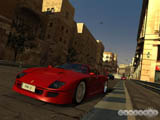 PGR 2 is perhaps one of the most beautiful games I have ever seen. The graphics
seem almost unmatched, with realisitic textures, appropriate lighting, defined
bump-mapping and so much more. But the gameplay itself is also very good as
well. Offering much more than the first PGR, such as more cars, more cities
and more ways to earn Kudos, PGR 2 is a much improved product over the first game.
The Kudos point system is more refined, and much more fair, and that makes playing
the game much more enjoyable. I've put in over 40 hours into this game, and that's
just offline. PGR 2 also boasts a pretty big online experience through Xbox Live,
but doesn't use it as a crutch to make up for a lacking single-player mode. It's one
of the few games I've played where the single player mode has as much depth (maybe
even more so) than it's online and multiplayer components.
PGR 2 is perhaps one of the most beautiful games I have ever seen. The graphics
seem almost unmatched, with realisitic textures, appropriate lighting, defined
bump-mapping and so much more. But the gameplay itself is also very good as
well. Offering much more than the first PGR, such as more cars, more cities
and more ways to earn Kudos, PGR 2 is a much improved product over the first game.
The Kudos point system is more refined, and much more fair, and that makes playing
the game much more enjoyable. I've put in over 40 hours into this game, and that's
just offline. PGR 2 also boasts a pretty big online experience through Xbox Live,
but doesn't use it as a crutch to make up for a lacking single-player mode. It's one
of the few games I've played where the single player mode has as much depth (maybe
even more so) than it's online and multiplayer components. |
  |
Burnout 2: Point Of Impact
[Acclaim - Cube/Xbox/PS2 - 2003]
 Burnout 2 is just one of those games you can pick up and play anytime and
have fun. Much more improved over the first game in the series, B2 takes arcade
racing to the next level with more crash junctions, better particle effects, more
ways to score, and more speed. This game is fast, probably second to F-Zero GX
in terms of exhilarating speed. Burnout 2 really doesn't do much to turn the genre
on it's ear, but it has some of the tightest gameplay mechanics around. B2 does
everything an arcade racing game should, provide a fun, frantic and intense
racing experience. It's also one of those games where you can have the sick
pleasure of watching a gruesome 15-car pileup, and laugh while watching the chaos
ensue.
Burnout 2 is just one of those games you can pick up and play anytime and
have fun. Much more improved over the first game in the series, B2 takes arcade
racing to the next level with more crash junctions, better particle effects, more
ways to score, and more speed. This game is fast, probably second to F-Zero GX
in terms of exhilarating speed. Burnout 2 really doesn't do much to turn the genre
on it's ear, but it has some of the tightest gameplay mechanics around. B2 does
everything an arcade racing game should, provide a fun, frantic and intense
racing experience. It's also one of those games where you can have the sick
pleasure of watching a gruesome 15-car pileup, and laugh while watching the chaos
ensue. |
  |
The Legend Of Zelda: Ocarina Of Time
[Nintendo - Nintendo 64 - 1998]
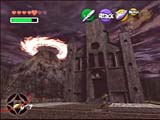 I'll admit, when this game was approaching release, I wasn't looking forward
to it as much as other N64 owners were. In fact, I was anticipating the release
of F-Zero X much more than this. But after finally having the chance to play the
game, I found OOT to be a very big and great adventure title that the N64 was sorely
lacking. There was so much to do and see in this game, and it really felt like
a smooth transition from 2-D to 3-D. It's also pretty amazing how much Nintendo
was able to cram into such limited memory capacity as well. Really, if you
wanted an adventure this big, you would have to go for the PlayStation, but
Nintendo really held it's own with this release.
I'll admit, when this game was approaching release, I wasn't looking forward
to it as much as other N64 owners were. In fact, I was anticipating the release
of F-Zero X much more than this. But after finally having the chance to play the
game, I found OOT to be a very big and great adventure title that the N64 was sorely
lacking. There was so much to do and see in this game, and it really felt like
a smooth transition from 2-D to 3-D. It's also pretty amazing how much Nintendo
was able to cram into such limited memory capacity as well. Really, if you
wanted an adventure this big, you would have to go for the PlayStation, but
Nintendo really held it's own with this release.
|
  |
Star Fox
[Nintendo - Super NES - 1993]
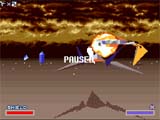 Star Fox was a pretty revolutionary game back when it debuted. As the first
"Super FX" game, Star Fox brought a new look and feel to videogames : 3-D polygons.
Sure, the graphics seem rather primitive today, and Star Fox 64 looked a little
better, but the gameplay is still solid as a rock. It's almost like playing a side
scrolling shooter in a different perspective. While Star Fox 64 added more into
this word, I didn't include the game on the list because I felt the game was too
easy, and I didn't see much of a reason to include it on the list. The original,
however, is still pretty challenging, and it's still fun to play. It has almost
a timeless quality to it.
Star Fox was a pretty revolutionary game back when it debuted. As the first
"Super FX" game, Star Fox brought a new look and feel to videogames : 3-D polygons.
Sure, the graphics seem rather primitive today, and Star Fox 64 looked a little
better, but the gameplay is still solid as a rock. It's almost like playing a side
scrolling shooter in a different perspective. While Star Fox 64 added more into
this word, I didn't include the game on the list because I felt the game was too
easy, and I didn't see much of a reason to include it on the list. The original,
however, is still pretty challenging, and it's still fun to play. It has almost
a timeless quality to it. |
  |
Wave Race 64
[Nintendo - Nintendo 64 - 1996]
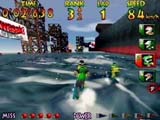 Wave Race 64 was my first N64 game, and it still stands out as one of my
favorite games of all time. Sure, I could have gone for Mario 64, but it
seemed like that was the game that everyone had. I wanted a game that was
different, but still looked pretty impressive. WR64 was that game. It was
a racing game, but in water instead of land, and that changes the way
you race. Water is a continuosly moving form, unlike a road, and you
have to anticipate those changes often. The graphics were pretty damn impressive
as well. The water created for the game actually looked like water, and the
waves were pretty dynamic and effected the whole racing environment. But
as for the gameplay itself, it was a fairly good balance between the racing
and stunt mode. Speaking of the stunt mode, that right there made WR64 a very
addictive experience. Wave Race Blue Storm captures much of what made the WR 64
great, and with better graphics, but 64 pretty much deserves the credit.
Wave Race 64 was my first N64 game, and it still stands out as one of my
favorite games of all time. Sure, I could have gone for Mario 64, but it
seemed like that was the game that everyone had. I wanted a game that was
different, but still looked pretty impressive. WR64 was that game. It was
a racing game, but in water instead of land, and that changes the way
you race. Water is a continuosly moving form, unlike a road, and you
have to anticipate those changes often. The graphics were pretty damn impressive
as well. The water created for the game actually looked like water, and the
waves were pretty dynamic and effected the whole racing environment. But
as for the gameplay itself, it was a fairly good balance between the racing
and stunt mode. Speaking of the stunt mode, that right there made WR64 a very
addictive experience. Wave Race Blue Storm captures much of what made the WR 64
great, and with better graphics, but 64 pretty much deserves the credit. |
  |
Super Mario World
[Nintendo - Super NES - 1991]
 Super Mario World was pretty much the first game on the new Super NES system,
as it came packed-in with the console. Too bad we don't see that more often today,
you know, where you ACTUALLY got a game with your system. Anyway, SMW set out
to create a bigger platform experience than Super Mario Bros. 3. More stages,
more secrets, more effects just more, more, more. SMW also was where we first
saw Yoshi, which added some different elements to the SMB world. Yoshi could
do things that Mario couldn't, such as clear certain enemies, walk on certain surfaces
that Mario couldn't and so forth. While it's not my #1 favorite Mario game, it
is one of the best.
Super Mario World was pretty much the first game on the new Super NES system,
as it came packed-in with the console. Too bad we don't see that more often today,
you know, where you ACTUALLY got a game with your system. Anyway, SMW set out
to create a bigger platform experience than Super Mario Bros. 3. More stages,
more secrets, more effects just more, more, more. SMW also was where we first
saw Yoshi, which added some different elements to the SMB world. Yoshi could
do things that Mario couldn't, such as clear certain enemies, walk on certain surfaces
that Mario couldn't and so forth. While it's not my #1 favorite Mario game, it
is one of the best. |
  |
Jet Grind Radio
[Sega - Dreamcast - 2000]
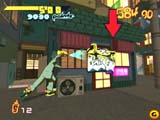 One of the most unique gameplay experiences I've ever had. I remember picking
this up for $5.50 at a Target store just to see what it was like. Little did I
know that this would be one of my favorite games. The look of JGR was much different
compared to other games on the market. While this wasn't the first game to use
cel-shading (that was done in Fear Effect), it was one to pull off the technique
in a full 3-D environment succesfully. The visuals really made the game come alive,
as well as the soundtrack, which is one of the best done for a videogame. The gameplay
was different as well. Your main goal was to tag on specific areas. Never really
been done before in a game. Now, you may wonder why I forgot about Jet Set Radio
Future on the Xbox. Well, I haven't. I'm actually still playing through that one.
While the graphics are sharper, I don't like the change in gameplay. JSRF may
make an appearance in a future list, but for now, JGR makes the cut.
One of the most unique gameplay experiences I've ever had. I remember picking
this up for $5.50 at a Target store just to see what it was like. Little did I
know that this would be one of my favorite games. The look of JGR was much different
compared to other games on the market. While this wasn't the first game to use
cel-shading (that was done in Fear Effect), it was one to pull off the technique
in a full 3-D environment succesfully. The visuals really made the game come alive,
as well as the soundtrack, which is one of the best done for a videogame. The gameplay
was different as well. Your main goal was to tag on specific areas. Never really
been done before in a game. Now, you may wonder why I forgot about Jet Set Radio
Future on the Xbox. Well, I haven't. I'm actually still playing through that one.
While the graphics are sharper, I don't like the change in gameplay. JSRF may
make an appearance in a future list, but for now, JGR makes the cut. |
  |
Tetris
[Nintendo - Game Boy - 1989]
 Was it Tetris that made the Game Boy successful, or was it the Game Boy that
made Tetris? Either way, Tetris has been one of the most successful and phenominally
popular puzzle games ever created. There have also been many versions of Tetris
out there through different developers and publishers. But the Nintendo version
of Tetris is the best out of the rest. While the main game is the same, the
scoring is different. Nintendo seems to have the best scoring system for Tetris
compared to the other versions made. It's hard to imagine the Game Boy without
Tetris, and if Tetris never appeared on the Game Boy, would it be as succesful
today. Fortunatley, we'll never have to know.
Was it Tetris that made the Game Boy successful, or was it the Game Boy that
made Tetris? Either way, Tetris has been one of the most successful and phenominally
popular puzzle games ever created. There have also been many versions of Tetris
out there through different developers and publishers. But the Nintendo version
of Tetris is the best out of the rest. While the main game is the same, the
scoring is different. Nintendo seems to have the best scoring system for Tetris
compared to the other versions made. It's hard to imagine the Game Boy without
Tetris, and if Tetris never appeared on the Game Boy, would it be as succesful
today. Fortunatley, we'll never have to know. |
  |
Mega Man 2
[Capcom - NES - 1988]
 Mega Man 2 improves upon the first MM, and mostly establishes the standard
we've seen in future releases. Capcom increased the number of robot bosses from
6 to 8, introduced "E" tanks which replenished energy right on the spot and
introduced a password system to continue the game later on (the first Mega Man
game didn't have a password system). Mega Man 2 also marks as one of the games
in the series with the most memorable music tracks and the most memorable
robot bosses, which include Bubble Man, Wood Man, Metal Man and Quick Man. It's
also one of the hardest Mega Man games as well.
Mega Man 2 improves upon the first MM, and mostly establishes the standard
we've seen in future releases. Capcom increased the number of robot bosses from
6 to 8, introduced "E" tanks which replenished energy right on the spot and
introduced a password system to continue the game later on (the first Mega Man
game didn't have a password system). Mega Man 2 also marks as one of the games
in the series with the most memorable music tracks and the most memorable
robot bosses, which include Bubble Man, Wood Man, Metal Man and Quick Man. It's
also one of the hardest Mega Man games as well. |
|